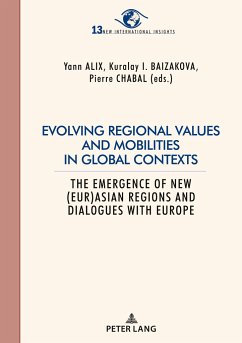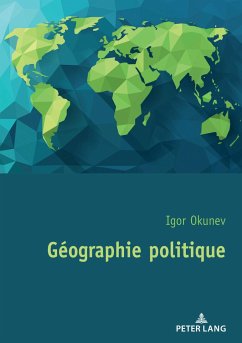
Cross-border exchanges
Eurasian perspectives on logistics and diplomacy
Herausgegeben: Chabal, Pierre; LaGro, Esra; Janar, Turtogtokh; Vassort-Rousset, Brigitte; Nicharapova, Jildiz; Baizakova, Kuralay
Versandkostenfrei!
Versandfertig in 6-10 Tagen
53,50 €
inkl. MwSt.
Weitere Ausgaben:

PAYBACK Punkte
0 °P sammeln!
The main purpose of the book is to examine from numerous and distinct, albeit complementary perspectives how logistics feeds into region-building. The angle of approach is to reach resolutely beyond logistical and material aspects of border-crossing in order to tackle cultural, symbolic, identity-based as well as institutional, legal and political dimensions of the contemporary 'pooling' of sovereignties in today's Eurasia. Thus, constitutive chapters of the book draw from analyses as remote as historical, environmental, diplomatic and cybernetic, to mention but a few. Its main conclusions are...
The main purpose of the book is to examine from numerous and distinct, albeit complementary perspectives how logistics feeds into region-building. The angle of approach is to reach resolutely beyond logistical and material aspects of border-crossing in order to tackle cultural, symbolic, identity-based as well as institutional, legal and political dimensions of the contemporary 'pooling' of sovereignties in today's Eurasia. Thus, constitutive chapters of the book draw from analyses as remote as historical, environmental, diplomatic and cybernetic, to mention but a few. Its main conclusions are that region-building consists largely in concrete changes that affect material aspects of country-to-country dynamics, not just in material-political decisions even if these remain necessary to launch a novel process and to secure it into confidence-building. This blend of logics also involves a multi-scale evolution whereby both local (infra-regional) and regional (supra-national) levels, taken together, make sense. Hence, to probe into one dimension only - the changing nature of borders, both in Europe and Asia, from lines of sovereign divisions to passage-points for exchanges -, induces the bilateral and multi-lateral capacity to 'innovate' within long-term historical givens and to turn nationalistic hostility into dynamics of multiplication of shared exchanges and profits. From a methodological requirement, comparing what seems at first, very different - a fully integrating Europe and a newly co-operative Asia - makes it possible, on the face of it, to uncover and decipher dynamics that are similar in their essence (regional, post-war) even if they differ in details (institutional idiosyncrasies, hurdles).














